I ran into an aquaintance– a man that given the social context that we met in knows that I’m a hugger and open to hugs. We’ve hugged before when saying hello, which is something that I’m almost always comfortable with. However, this time, he kissed me. It took me completely by surprise– and I couldn’t shake the twisting, nauseating feeling I had all night because of it.
I was also infuriated with myself for the rest of the week because my reaction afterwards was to silently move away and completely ignore what he’d done. I, like pretty much every single woman in the history of ever … let it go. And letting it slide like that made me feel horribly guilty, like I’d “failed” in some way, that I wasn’t a “good feminist” if I couldn’t even call out the behavior that’s happening to me. Here I am, babbling away on the internet about consent and boundaries and safe spaces and then something like this happens and I freeze.
I’m not saying that a man’s boundaries can never be crossed or that it’s only women who freeze up when someone does something to us that we don’t like or don’t want– there are some don’t ever make a scene! dynamics to what is considered “good manners” in our culture, regardless of gender.
However, women are socialized to accept things that men don’t have to live with, such as the above example. I asked Handsome, and having to put up with people grabbing, touching, slapping, pinching, groping, hugging, or kissing him isn’t something he has to deal with when he goes out. However, many social functions I’ve been to involves surviving an obstacle course of men trying to do all that, and me having very little recourse.
A few years ago I was at a birthday party, and one of the men there got very drunk and groped my ass. I reacted to this with the absolutely suitable “hey! I don’t appreciate that, don’t touch me again” and every single last man in that room poo-pooed me with “oh, that’s just the way he is, he doesn’t mean anything by it” and him walking around like a kicked puppy for the rest of the night … and I felt horrible, like I had done something wrong by standing up for myself and asking for a pretty basic physical boundary to be respected.
The same thing happened when that man kissed me without my permission– even though I didn’t visibly react, or do or say anything, I walked around for the next few days second-guessing myself. It’s just the way he is. He didn’t mean anything by it looped around my head. I felt that I didn’t have the “right” to feel the way I did about it, that the sick feeling in my stomach was me making a big deal out of nothing.
In retrospect, obviously, I have every right to feel violated by being kissed without my permission. That I felt gross and dirty afterwards is a feeling I should respect and trust– it’s my body and mind trying to tell me something about what had happened, and no amount of “it was nothing” was going to be able to take that away.
Women spend a lot of time telling ourselves it was nothing, and that is a monstrously difficult lie to overcome. It’s a lie we’re told by no one– and everyone. It’s the lie we believe when we’re at a party and we’re suddenly A Raging Bitch because we dared to say something when we were assaulted. It’s the lie in the back of our head when a man is acting in a way that sets every alarm we have to screaming, but we force ourselves to ignore it because it couldn’t be that big a deal, right?
My big take-away from all that is this: not being able to say “don’t do that” isn’t a failure on my part. Standing up to the near-overwhelming pressure to not be that bitch and enforce our physical boundaries isn’t something that should always and forever be shouldered by women. I wish it didn’t feel like such a monumental thing to ask of men not to be that guy, but it is. Why should it always be our responsibility to tell men that they’ve been a dick? It should be the responsibility of every decent human being to enforce a social code like don’t kiss people without their permission, instead of the misogynistic code we have right now that reads don’t make a man feel bad about acting like a dick.


